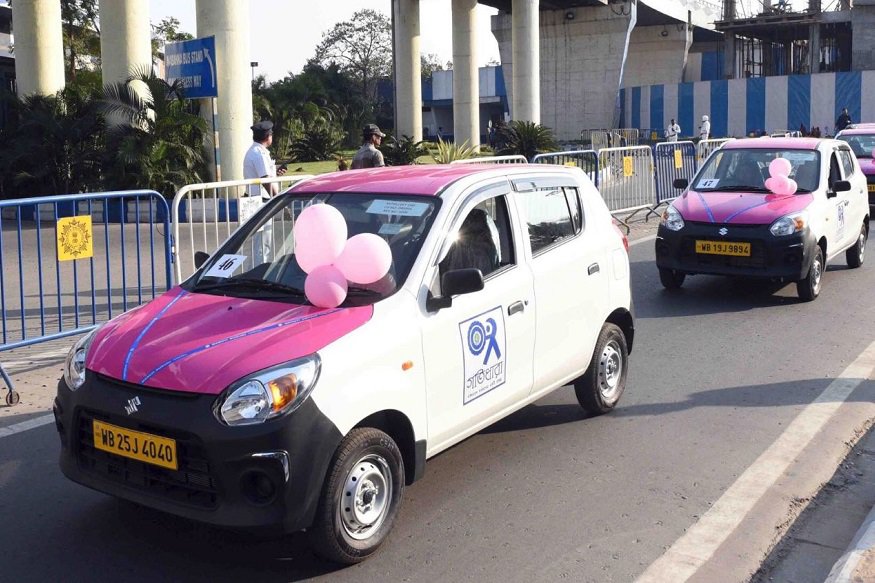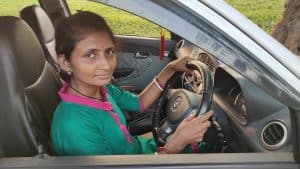Shankari Halder finally dreamed of steering her life in the right direction when she became a commercial cab driver in Kolkata, early this year. The 36-year-old was one among the 10 women who were trained to operate a first-of-its kind cab service in Kolkata. Christened as Pink Taxis, these 10 cabs were launched primarily with the aim of providing a secure and safe commute environment for women, who often find it risky to travel in cabs driven by male chauffeurs.
Chief Minister Mamata Banerjee flagged off the first fleet of 10 taxis painted in pink and white from Nabanna, the state headquarters, on February 21, 2019. The event was marked by wide media coverage and the publicity machinery of the state government went on an overdrive to portray it as yet another milestone by the state government in providing safety on roads for women, particularly office goers. The women drivers looked confident in their green uniforms with pink jackets.
It was also hailed as an important step in creating livelihoods through the Gatidhara scheme, under which unemployed people were enabled to acquire commercial vehicles, with a state subsidy. The state government hiked the subsidy from Rs 1 lakh to Rs 1.5 lakhs for the women cab drivers who would drive the pink taxis. Handing over the car keys to 10 women drivers of Pink Cabs, the CM had said that the move was aimed at encouraging women to be in the driver’s seat.
Logistical support was provided by Azad foundation, a non-profit working for women and Sakha Consulting Wings, a social enterprise providing safe transport solutions. Azad Foundation trained the women in driving while Sakha continues to provide operational and financial support to the business.
“The total cost of the vehicles was nearly Rs 4 lakh. We offered monetary help of Rs 30,000 to each of the cab drivers as down payment for the four-wheelers. The rest of the amount was to be paid in monthly instalments of around Rs 6800, for the next four years after deducting the subsidy of Rs 1.5 lakhs,” said Chameli Das, city head of Sakha consulting wings. The fare revenue goes to Sakha, which pays a monthly stipend to the drivers.
“We looked for prospective women who were interested in driving and then Azad Foundation trained them for six months in driving and also basic spoken English. We also counselled them as most of them were entering business for the first time. Out of the ten, seven cab drivers are directly working with us now, while the rest are driving independently,” said Das.
Dreams collide with reality
Overwhelmed by the words of encouragement from the government, Shankari thought of leaving her dark and dank world behind and putting her life on the fast track. After all, she had suffered a lot in the past three decades — as a child bride and then, a victim of domestic violence at the mercy of an abusive husband.
“Life had been hellish for me because of the constant torture and brutality of my husband who believes that women are born to stay within the boundaries of their houses and remain life-long slaves to them,” she says, “I thought that the pink taxi would give me the freedom to stand on my feet and fulfil the needs of my two children independently. But the reality is quite different now. The taunts and violence of my husband has only increased over the past few months as I have failed to bring home the money I thought I would.”
Shankari is not alone. Almost all the pink taxi drivers have heart-wrenching stories of poverty and abuse, made more tragic by the failure of the initiative. Most of them feel that the state government has dumped them after having achieved its purpose of earning initial brownie points from different sections of the society.
“There has been hardly any promotional campaign around pink taxis since the launch in February. We hardly get customers because most of the people don’t know about the pink taxis operating in the city. There are also hardly any display boards on the four-wheelers that indicate that it is a commercial vehicle or a taxi.”
Thankless, futile days
“We ride around the city in vacant cars and return homes at night empty-handed. Our family members scorn and rebuke us for wasting time in a useless job,” says 40-year-old Reba Kayal Mondal, a pink taxi driver, adding that it’s difficult to even earn Rs 400 after toiling for 10-12 hours in a day.
Reba also blames the lack of parking space for poor income, “The government had promised to provide dedicated parking spots at important junctions like railway stations, markets and airports for pick-ups. But they have done nothing. We are fined heavily by traffic cops and harassed by fellow taxi drivers if we stop or park our vehicles in the wait for passengers.”
Reba didn’t mince words in accusing cops of harassing them; “The men-in-uniform act like a villain for us. They fine us heavily for the slightest mistake and use abusive language bringing us to tears. Men driving four wheelers are let off lightly for the same kind of lapses but if it’s us, they shout at us, saying that we are fit only for household work. Even auto drivers and other commercial vehicle drivers throw humiliating and vulgar comments at us. They find it difficult to digest that women are sitting at the wheels.”
Problems galore
Another major problem cited by the women drivers is the absence of washroom facilities for them, “Unlike men, we cannot relieve ourselves in the open. But the moment, we park our cars near public toilets, cops come barging at us and charge at our vehicles with sticks. It is leading to serious health issues in the absence of proper facilities for us. But the authorities are yet to take it seriously,” pointed out Archana Munda, 37, another cab driver.
The frustration of these women drivers could be understood from the fact that most of them are now keen to quit the services and seek employment with some private corporate organisations or individuals. “It is very difficult to earn a livelihood in this manner. We are planning to quit and find more stable, long term jobs with some companies,” said Shankari.
Even Chameli agrees that the situation must change for the service to be sustainable.
“We get rental bookings through online and phone on regular basis. Our rates are cheaper than others as we charge Rs 800 for four hours of booking, excluding the Goods and Services Tax (GST). We bear the fuel (petrol), EMI and salaries of the cab drivers but the expenses exceed their incomes every month. We pay around Rs 7000 – Rs 12000 every month to the drivers, but there should also be a source for generating income. Flying customers pay just Rs 25 per kilometre as compared to the regular yellow taxis that charge Rs 40 for the same distance. The fare from the flying customers goes entirely to them, but they hardly get any passengers because of lack of awareness.”
The cab drivers say that joining private cab services like Ola and Uber isn’t a good option, “The work entails fixed targets and working for long hours which is not possible for homemakers like us. The private cab operators also charge hefty percentages as commission, which would make it unviable for us,” said Shankari.
Assurance from officials
When contacted, state transport department officials refuted allegations of lack of publicity to the pink cabs, “The government has been trying its best to promote them by putting out regular advertisements; their allegations are baseless. In fact, we have got more applications this year for pink taxis under the Gatidhara scheme; Not just pink cabs, under the scheme, over 34000 unemployed people have received subsidies in the past three years,” said Chapal Banerjee, executive officer, Gatidhara cell, state transport department.
However, he was unable to cite any statistics about the date or number of fresh applications received (from women drivers), or even the date on which the last advertisement on pink taxis was published.
Senior cops, however, assured that they would look into the allegations levelled by drivers against the police on duty. “We have not received any formal complaints of harassment and misbehaviour of the women cab drivers by the cops. They should lodge a complaint with us and stern action will be taken against those behaving inappropriately,” said Santosh Pandey, DC (traffic), Kolkata Police.
| If you are in Kolkata and want to book a pink taxi, call +91 7605870555 or book online.
Initially, meant exclusively for women passengers, the cabs may now accommodate men too but are free to reject passengers at their discretion. |


